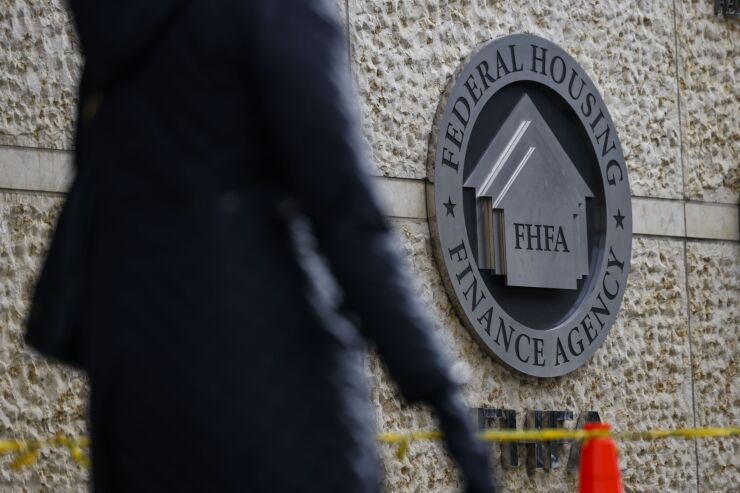The housing industry cheered the Federal Housing Finance Agency's cancellation of the loan level price adjustments
Already, the FHFA
The Mortgage Bankers Association and many others in the field had argued that debt-to-income ratios can change on a daily basis, which would necessitate frequent recalculation of appropriate pricing and risk misleading borrowers about costs.
"I appreciate the feedback FHFA has
It will be issuing a request for input on a fee pricing framework "shortly."
Republican members of Congress
"The industry can breathe a sigh of relief," Peter Idziak, senior associate at the law firm of Polunsky Beitel Green, said in a statement. "But the announcement and subsequent walk-back of the DTI LLPA are nevertheless concerning…because it shows that FHFA doesn't fully understand or appreciate the challenges facing lenders today. Nor does the agency contemplate how its policies can affect borrowers."
Early statements from industry groups and housing advocates welcomed the decision.
"The GSE pricing grid is a complex balancing of the objectives of access to mortgage credit for underserved borrowers and safety and soundness, and [the Community Home Lenders of America] believes today's action to end the use of DTI LLPAs will enhance those dual objectives," said Scott Olson, its executive director.
The Mortgage Bankers Association had said the fee was unworkable for lenders.
"MBA urges FHFA to continue its engagement to improve clarity and transparency regarding the GSEs' pricing framework," a statement from president and CEO Bob Broeksmit said. "We will continue our work with the agency, the GSEs, lawmakers, and the Biden administration on policies and actions that lower costs and advance sustainable access to homeownership while protecting taxpayers."
This will help first-time home buyers whose total debt comes close to that 40% level, David Dworkin, president and CEO from the National Housing Conference said.
"Borrowers who have proven adept at managing their obligations do not pose additional risk due to a few points on a DTI ratio," Dworkin wrote in a statement. "In fact, many will save money by becoming homeowners in areas where rents are high."
NHC is also supportive of the RFI process, saying the issue cannot be solved in "sound bites, talking points or editorials."
Risk-based pricing has outlived its purpose, Dworkin argued, calling for a return to the government-sponsored enterprises charging the same guarantee fee to all borrowers, as was the practice between 1938 and 2008. That pricing system is also currently used by the Federal Housing Administration mortgage insurance program.
The U.S. Mortgage Insurers agreed that the LLPAs need to be reconsidered, noting the housing finance system is very different from what it was 15 years ago when these were introduced as a temporary measure to mitigate risk.
The FHFA must "undertake a thoughtful, holistic review of the LLPAs with a critical eye towards reducing or eliminating redundant fees assessed on borrowers with low down payment mortgages backed by private MI," the USMI statement said. "With the strong underwriting standards and prudent risk management in today's housing finance system, LLPAs should appropriately recognize the critical protection against credit loss that private MI provides to lenders, the GSEs, and taxpayers."
Collaboration with the industry and other stakeholders is needed to ensure any changes do not affect affordability for those that need low down payment mortgages, USMI said.
Using DTI "can unfairly penalize lower-wealth but purchase-ready Black and Latino borrowers, which perpetuates the racial homeownership gap," according to a statement from Mike Calhoun, president of the Center for Responsible Lending. "We look forward to providing input to the agency on a process for setting single-family guarantee fees that will help eliminate barriers that prevent low-wealth borrowers from purchasing a home, while ensuring the housing Enterprises remain appropriately capitalized."






